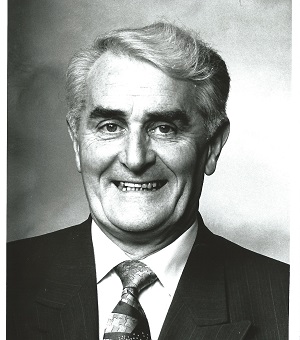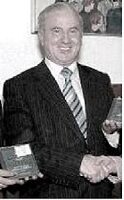
Dr Gay Corr, who died at the age of 85 on July 1, 2024, was the Founding Father of the Regional Technical College (RTC), Galway, which became Galway-Mayo Institute of Technology in January 1998 (GMIT, now part of Atlantic Technological University since March 1, 2022), serving as its inspirational and visionary leader for thirty years. He made an inestimable contribution to the promotion of higher education in the West of Ireland, and across the country. One of his achievements on the national stage was serving for three terms on the Higher Education Authority (HEA), and as its chairperson from 1990 to 1993. A gentleman, with great integrity and decency, he had a deep sense of public service, and was held in the highest of esteem by staff and students.
Gay Corr was born on November 22, 1938, the only son of James Corr and his wife, May, née Concannon near Irishtown, close to the Mayo Galway border. After completing his primary education at Logboy National School, he won a scholarship to St Jarlath’s College, Tuam, from 1952 to 1957. He then went to University College, Galway, to study science. After graduating with a first-class honours degree in 1961, he secured employment as a chemist with the Central Laboratory of the Irish Flour Millers’ Association until 1964, before moving to the Dublin Health Authority, and later to An Forás Talúntáis. During that time, he lectured part-time at Bolton Street College of Technology. He was appointed Head of Science at the new Regional Technical College in Athlone in September 1970.
After a public competition, Gay Corr, was appointed as Principal of the new Regional Technical College, Galway, early in 1972 (the title was changed to Director in 1993 and to President in 2007). On April I, 1972, he started in RTC Galway, and did Trojan work to have staff and students in the new college in September that year. He established a college of high morale and a wonderful atmosphere.
On December 16, 1974, Richard Burke, Minister for Education, caused consternation when he made a major announcement in relation to higher education, including a decision to remove degree-awarding powers from the National Council for Educational Awards (NCEA), which then had legal responsibility for validating all higher education programmes outside the universities. The first submission for a degree in a RTC came from Galway for a programme in Hotel and Catering Management, which had been evaluated before the December 1974 decision, and was approved shortly afterwards. When the NCEA was re-constituted in February 1976, its powers to grant and confer awards applied to National Certificates and Diplomas only. When the Galway students were to be conferred with ‘Advanced Diplomas in Hotel and Catering Management’, they refused to accept then on November 15 1976. Gay Corr, in a firm and courageous public address, fully supported the students in their actions. It was the finest hour of Gay Corr’s distinguished career, for which he received deserved praise far and wide, including editorials in local and national newspapers. Within a few days of becoming Minister for Education on December 2, 1976, Peter Barry informed the NCEA that it could award degrees to the 1976 class, which happened on May 9, 1977.
From the late 1980s, RTC Galway established other campuses in the region, including the Agricultural College in Mountbellew (1986), Connemara West in Letterfrack (1987), a Mayo Campus in Castlebar (1994), and the Cluain Mhuire in Galway City (1994). The new Learning Resource Centre at the main campus was completed in 2002.
Gay Corr had a big role in getting research established as an integral part of the work of RTCs. As Chairperson of the Association of Principals of the RTCs from 1987 to 1990, he had a pivotal role in the deliberations that preceded the enactment of the Regional Technical Colleges’ Act of 1992, under which each college became an autonomous institution of higher education, and enabled each to engage ‘in research, consultancy, and development work’. He served as a council member and later as vice-chairperson and chairperson of HEDCO, the Higher Education for Development Co-operation, and of EURASHE, the European Association of Higher Education Institutions outside the universities, serving for two years as its president.
In recognition of his outstanding contribution to RTC Galway and to higher education in Ireland, he was conferred with the degree of Doctor of Laws honoris causa by the NCEA on November 30, 1992. Nominated by the Students’ Union, he was selected as one of the Rehab Galway People of the Year in 2002. After directing the affairs of the college for thirty years with intelligence, shrewd judgment, energy, humane management, and respect for everyone, he retired on October 4, 2002. Dr Gay Corr deserves to be remembered as a pioneer in Irish Higher education from 1970 until his retirement in 2002.
